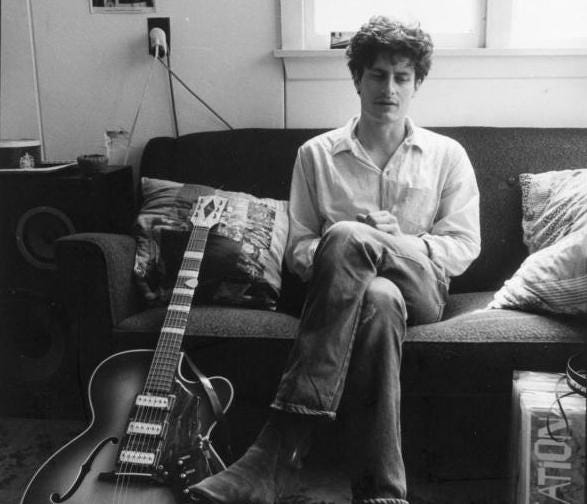When I finally got my hands on an original pressing of The Clean’s Boodle Boodle Boodle (albeit slightly warped and without the booklet full of drawings) aged 17, the high of purchasing the EP stayed with me for two weeks. I kept pulling it out of my record box just to admire Chris Knox’s artwork and handwritten scrawl that graced its back cover. I loved all the little details: the crossword puzzle, the friendly smiling sun, the uneven script that covered who had played on what track. It felt homemade, more like a present from a friend than a mass-produced product.
I don’t exactly remember how I got into The Clean, but it was this homemade quality that drew me in. The songs sounded like they were made in someone’s living room and that was mostly because they were. I loved the gently chugging organ of ‘Slug Song’, the hooks of ‘Tally Ho!’, and the jangly guitars of ‘Anything Could Happen’. Having cut my teeth on college rock with the likes of R.E.M. and The dB’s many years prior, I was primed to love The Clean and their contemporaries on New Zealand’s beloved indie label, Flying Nun Records.
The same week I had acquired Boodle Boodle Boodle, I was also lucky to snatch up their second EP, Great Sounds Great. Like its predecessor, the record featured handwritten notes on the back cover that had been cramped in to fit song credits, doodles, and random scribblings. Like many Flying Nun acts and artists of the Dunedin sound variety, their music and aesthetic promoted a certain authenticity. It was rough around the edges, but it was charming.
Great Sounds Great’s final song, ‘Point That Thing Somewhere Else’, is regarded by many as one of The Clean’s finest numbers. It’s a five-and-a-half minute psychedelic sprawl featuring droning guitars and a fervent beat. As the song progresses, the melodies become more hypnotic and intense. It’s not merely holding your attention, it’s gripping it.
‘Point That Thing Somewhere Else’ is also one of a handful of Clean songs that features Hamish Kilgour on lead vocals, and it’s arguably one of the finest moments in his musical career.
Despite having loved various Dunedin sound bands for two years now, I admittedly still don’t know that much about Kilgour. I first knew of him as the drummer for The Clean and a part of me will still see him as that before anything else. The Clean were a highly influential group, not just within Aotearoa but within the broader fields of indie music (see Pavement’s cover of ‘Oddity’). It’s natural that his biggest achievement is the first one that comes to mind.
But if there’s one thing I do know, it’s that Kilgour was an incredibly driven musician. After The Clean disbanded, Hamish joined his brother and fellow Clean founding member David Kilgour to release music under the moniker The Great Unwashed. Countless other projects followed, including Bailter Space and The Mad Scene, as well as a couple of solo records. In addition to his drumming and vocal duties, Kilgour also played guitar, produced, and designed album art. Here was a man that was constantly inspired to create, to make music for the hell of it regardless of what commercial gain may or may not lie ahead.
The other thing that I am certain of is that Kilgour was, if anything, a friendly face in the Flying Nun/Dunedin scene. Last year, I read Flying Nun founder Roger Shepherd’s memoir, In Love With These Times (the title of which is taken from a Clean song), and throughout its pages Hamish was a recurring character both on stage and in the Flying Nun offices as the label’s “first paid employee”. When I was at the height of my Chills fanaticism in 2020 and watched The Chills: The Triumph & Tragedy of Martin Phillipps documentary five times in one week (yes, really), Kilgour was there as an interviewee sharing both tales of the band and the Dunedin musical community.
I feel like whenever I’m trawling through the backlists and archives of Flying Nun history, his name always comes up eventually, whether it’s as a musician or simply as an extra pair of helping hands. It seems to me that he is synonymous with this scene - you can’t have one without the other. Kilgour, with his relentless enthusiasm and genuine spirit, has every right to be acknowledged as a stalwart figure within the larger Aotearoa music scene.
When talking about Kilgour, I can’t help but cycle back to his most well-known project, The Clean. They were one of the first bands I loved from the Dunedin sound before I even knew what the Dunedin sound was. To me, they bring a sense of comfort. Listening to The Clean is like listening to a friend play you some songs they put together the night before. There’s no pretensions, no overthinking. It’s homemade and heartfelt. It’s music at its rawest yet purest. Hamish Kilgour helped to create something that felt so utterly human, and for that he will be sorely missed.




